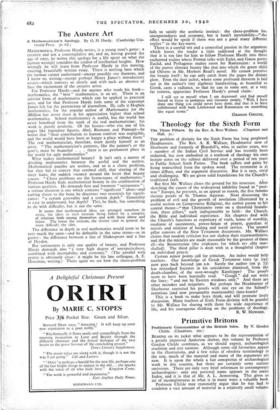Theology for the Sixth Form
The Three Pillars. By the Rev. A. Ross Wallace. (Chapman and Hall. 5s.; THE problem of divinity for the Sixth Form has long perplexed Headmasters. The Rev. A. It Wallace, Headmaster now of Sherborne and formerly of Blundell's, who, in earlier years, was a member of the Indian Civil Service and has recently been ordained, has now embodied in a textbook of theology his own lecture notes on the subject delivered over a period of ten years to Public School Sixth Forms. The book suffers and gains by being transcribed from the spoken word. The treatment is at times diffuse, and the argument discursive. But it is racy, vivid and challenging. We are given solid foundations for the Church's traditional faith.
But first Mr. Wallace dears the ground for his structure. After sketching the causes of the widespread infidelity found in " post- war " Europe, he presents, as an appeal to reason, the five famons theistic proofs of St. Thomas Aquinas. Next discussing the problem of evil and the growth of revelation (illustrated by a useful section on Comparative Religion), the author passes to his central theme—"that Christianity rests on a- threefold founda- tion, three pillars," each indispensable to faith : the Church, the Bible and individual experience. Six chapters deal with the Church's functions as repository of truth, home of worship, mediator of sacraments, power-house of praYer, guardian of morals and minister of healing and social service. The second pillar consists of the New Testament documents. Mr. Wallace claims that modern criticism has not shaken their trustworthiness, and that the miracles are made reasonable by the greatest of them all—the Resurrection (the evidences for which are ably. mar- shalled). The third pillar is dealt with in a thoughtful chapter on individual prayer.
Certain minor points call for criticism. An index would help teachers. Our knowledge of Greek Testament texts (p. 135) now goes back beyond 300 A.D. Surely: the author (on p. 73) has misjudged Socrates in his considerate dismissal, from the death-chamber, of the over-wrought Xanthippe? The proofs seem to have been hurriedly read. "Gough" did not write • the lines : " and not by Eastern windows only." And there are other mistakes and misprints. But perhaps the Headmaster of Sherborne corrected his proofs with one eye on the School's notorious (and now presumably mentionable) time-bomb?
This is a book to make boys think, and will proinote lively discussion. Many teachers of Sixth Form divinity will be grateful to Mr. Wallace for sharing with them his wide experience of life, and his courageous thinking on the problems of theology.
R. W. HOWARD.


























 Previous page
Previous page